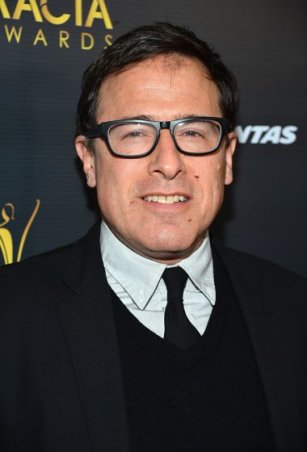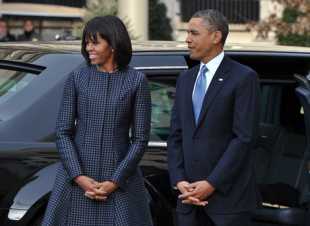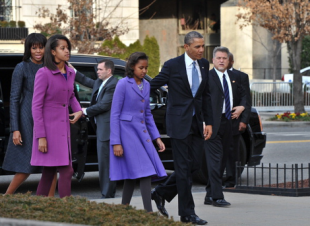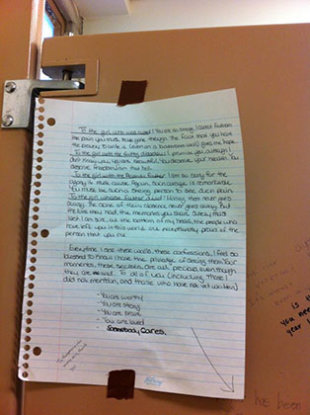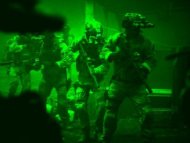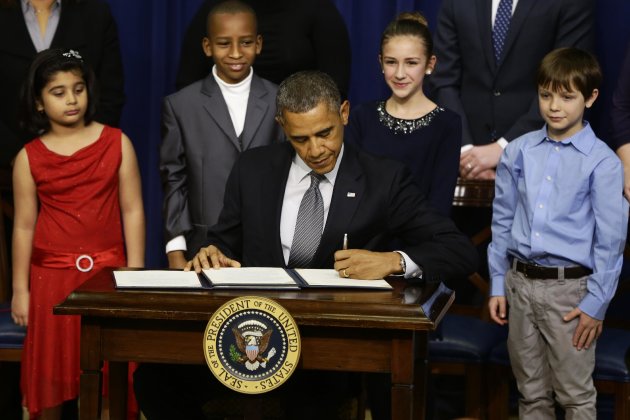 (Left to right): Hinna Zeejah, 8, Taejah Goode, 10, Julia Stokes, 11, and Grant Fritz, 8, who wrote to President …
(Left to right): Hinna Zeejah, 8, Taejah Goode, 10, Julia Stokes, 11, and Grant Fritz, 8, who wrote to President …Invoking
the painful memory of the schoolchildren killed in Newtown, Conn., a
month ago, President Barack Obama on Wednesday announced the most
ambitious gun-control drive in generations. Proposals include universal
background checks as well as bans on assault weapons and ammunition
clips that hold more than 10 bullets. Some of his proposals are sure to
run headlong into fierce opposition from Republicans and some Democrats
in Congress, as well as the powerful National Rifle Association lobby.
"I will put everything I’ve got into this,” Obama, standing alongside
Vice President Joe Biden, promised an audience that included relatives
of the first-graders slaughtered at Sandy Hook Elementary School,
survivors of other mass shootings and elected officials.
"While there is no law, or set of laws, that can prevent every
senseless act of violence completely, no piece of legislation that will
prevent every tragedy, every act of evil, if there’s even one thing we
can do to reduce this violence, if there’s even one life that can be
saved, then we’ve got an obligation to try," Obama said in his speech.
"And I’m going to do my part."
The president declared himself a firm believer in the Second
Amendment and denounced those who will cast his "common-sense" approach
as "a tyrannical, all-out assault on liberty." He also warned those
inclined to support his strategy that passage "will be difficult."
“This will not happen unless the American people demand it. If
parents and teachers, police officers and pastors, if hunters and
sportsmen, if responsible gun owners, if Americans of every background
stand up and say, ‘Enough, we’ve suffered too much pain and care too
much about our children to allow this to continue,' then change will
come," he said. "That’s what it’s going to take."
Bowing to political reality, Obama’s proposals include a wave of 23
executive actions that circumvent Congress, where most Republicans and a
few Democrats have balked at sweeping new restrictions they say could
trample constitutional gun rights. The potent NRA has also pledged to
defeat new gun control measures.
The executive actions include requiring federal agencies to report
more information to the federal background check system and directing
the Centers for Disease Control to research gun violence. But Obama
acknowledged that his more ambitious proposals would have to clear
Congress.
Biden, in his introductory remarks, said, "I have no illusions about
what we're up against." But "the world has changed, and it's demanding
action."
Administration officials who previewed Obama's proposals on a
conference call with reporters fleshed out some important details (on
condition that they not be named)—and left some important questions
unanswered:
- They wouldn’t say whether any of the steps the president is
recommending would have prevented the massacre at Sandy Hook and other
recent mass shootings. One senior official on the call did say, "There’s
no question that both the actions that he’s taking and the legislation
that he’s proposing will save lives.”
- They did not provide an estimate of how many lives would be saved
annually if the president got everything he wanted, saying the social
science on gun deaths is not precise enough to do so.
- Obama isn’t sending “specific legislative language” to Congress,
the officials said, instead he's following his usual blueprint of laying
out principles and then letting lawmakers craft a bill.
- The proposals to limit the manufacture of new assault weapons and
ammunition clips with more than 10 bullets would not affect those
already on the market.
- How did they settle on 10 bullets (and not seven, or 15)? One
official said that number was taken from the 1994 assault weapons ban
that Obama hopes to renew and strengthen.
- Was the so-called "Fast and Furious" gun trafficking scandal a
factor in shaping the president's proposals? "It was not," said one
official.
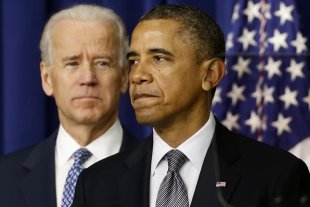 President Barack Obama, accompanied by Vice President Joe Biden, talks about proposals to reduce gun violence, …
President Barack Obama, accompanied by Vice President Joe Biden, talks about proposals to reduce gun violence, …
House Republicans gave the proposals a supremely cautious welcome. A
spokesman for Republican House Speaker John Boehner, Michael Steel,
said, "House committees of jurisdiction will review these
recommendations. And if the Senate passes a bill, we will also take a
look at that."
After the president's speech, Republican Florida Sen. Marco Rubio,
often cited as a possible presidential contender in 2016, vowed to
oppose the proposals.
“Nothing the president is proposing would have stopped the massacre
at Sandy Hook. President Obama is targeting the 2nd Amendment rights of
law-abiding citizens instead of seriously addressing the real underlying
causes of such violence,” Rubio charged in a statement.
And the NRA blasted Obama's approach, saying: "Attacking firearms and
ignoring children is not a solution to the crisis we face as a nation."
The organization also noted that "only honest, law-abiding gun owners
will be affected and our children will remain vulnerable to the
inevitability of more tragedy."
Sounding almost as cautious as Boehner, Democratic Senate Majority
Leader Harry Reid declared himself “committed to ensuring that the
Senate will consider legislation that addresses gun violence and other
aspects of violence in our society early this year.” That stopped well
short of embracing the president’s actual recommendations.
But Brady Campaign to Prevent Gun Violence President Dan Gross
praised the White House’s “tremendous leadership” and vowed to “work
with the administration over the coming months” to promote key
proposals.
And retired congresswoman and mass shooting survivor
Gabrielle Giffords plans to lobby her former colleagues, while national public opinion polls have shown a surge in popular support for new gun laws.
The president has long said he seeks a comprehensive strategy for
preventing future mass shootings while diminishing the death toll from
smaller-scale daily killings. Some of what he unveiled would require
congressional action, like the assault weapons ban. Some could be
achieved with merely a presidential signature—a step that could, in some
cases, inflame opposition in Congress, notably among House Republicans.
(Some of those are decidedly small-scale, however: One of the 23
"executive actions" trumpeted by the White House was that Obama will
"clarify" that Obamacare "does not prohibit doctors asking their
patients about guns in their homes.")
Obama scolded the Senate for failing to confirm a director for the
bureau of Alcohol, Tobacco, Firearms, and Explosives in six years and
said he would nominate the agency's acting director, Todd Jones, to the
post.
The proposals were the fruit of extensive discussions, led by Biden,
with victims' groups, organizations that represent gun owners, elected
officials and law-enforcement leaders.
Obama also wants to boost anti-bullying campaigns in schools, and
training for educators. Additionally he wants to give schools the
ability to use some federal funds to improve safety—but did not
explicitly echo the NRA’s demand for armed guards in schools.
Key steps also included imposing background checks on all gun
purchases. Right now, an estimated 40 percent fall outside existing law,
including those at gun shows and other "private" sales, according to
gun-control advocates. The existing system has stopped an estimated 1.5
million improper gun sales, according to an Obama aide, but "there's
still too many loopholes." The president directed Attorney General Eric
Holder to take a "fresh look" into whether the categories of people
prohibited from buying firearms needs to be expanded or updated.
Obama also aimed to thaw what the White House called a "freeze" in
scientific research of gun violence by the Centers for Disease Control.
And he urged Congress to bankroll the CDC to do research into possible
linkages between violent video games and other media images and
real-life violence, to the tune of $10 million.
“We don’t benefit from ignorance," Obama said. "We don’t benefit from not knowing the science of this epidemic of violence.”
The total cost of the president's proposals was estimated at $500 million.
 Jennifer Lawrence at Sunday night's SAG Awards (Photo: Getty/TNT)Contrary
to speculation, it appears Jennifer Lawrence's dress didn't necessarily
rip at Sunday night's Screen Actor's Guild awards show in Los Angeles
(above photo, right).
Jennifer Lawrence at Sunday night's SAG Awards (Photo: Getty/TNT)Contrary
to speculation, it appears Jennifer Lawrence's dress didn't necessarily
rip at Sunday night's Screen Actor's Guild awards show in Los Angeles
(above photo, right). Lawrence's dress made a full recovery, seen here in the press room on Sunday (Photo: Getty)The fashion savvy have observed that Lawrence's Dior Spring-Summer 2013 dress
is tiered. And when the award-winning actress hoisted up her dress to
make extra room for walking, she unwittingly grabbed the top tier,
leaving the bottom one still sagging low to the ground. The sheer panel that exposed her thighs was part of the lower tier and was not intended for our eyes.
Lawrence's dress made a full recovery, seen here in the press room on Sunday (Photo: Getty)The fashion savvy have observed that Lawrence's Dior Spring-Summer 2013 dress
is tiered. And when the award-winning actress hoisted up her dress to
make extra room for walking, she unwittingly grabbed the top tier,
leaving the bottom one still sagging low to the ground. The sheer panel that exposed her thighs was part of the lower tier and was not intended for our eyes.



